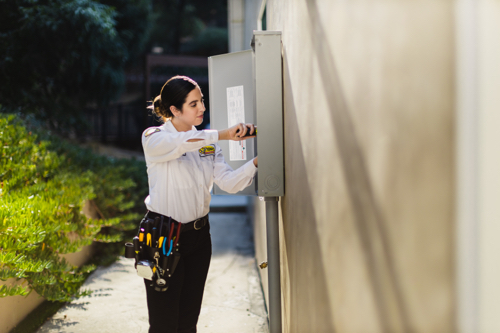Will A Surge Protector Work Without A Ground
A surge protector can be a powerful tool to keep your computers, television and other electronic devices safe from electrical overload. However, a surge protector generally won’t be effective if your home is not grounded. At best, it may offer limited protection for a short period of time before it ultimately fails long before the end of its useful life.
What Does It Mean for Your Home to Be Grounded?
A home is grounded when it has the ability to funnel excess electricity away from the home. For instance, a grounding terminal may be placed outside the home that is capable of drawing electricity created by a lightning strike away from your property. In some cases, the home itself can be used as a ground as it will be designed from materials that will absorb the energy created.
How to Properly Ground This Tool
While your home may be sufficiently grounded, it’s important to make sure that your surge protector is properly grounded as well. This typically means that it is tied to the protective line installed on or near your home. If it is not installed properly or your electrical system is not grounded , the surge protector will offer little or no support as it will have nowhere to send the excess electricity as it is created.
Watch Out for Open or Bad Grounds
An open ground occurs when you think that your surge protection system has been properly installed but it is not. This type of ground may occur as the result of improper wiring or other instances of human error. An open ground may also occur if resistance measures exceed electrical standards in your area.
In such a scenario, the extra demand could result in wires or insulation overheating. Although your home may be protected in the short-term, it will likely cause the surge protection system to wear out faster than it should. There is also the risk that it won’t offer adequate protection in the event of a lightning strike or other sudden surge in electricity.
A bad ground occurs when the grounding wire is either too long or does not create the shortest path for current to take. Ultimately, this can lead to surge protector damage as well as the possibility for current to flow in reverse from the protector itself. This can result in unnecessary damage or enhance the amount of damage caused by an unexpected surge.
Make Sure to Inspect Outlets and Power Strips
An easy way to prevent the risk of electrical damage to an electrical surge is to test indoor outlets and power strips. Ideally, a power strip will have a grounding pin included while outlets can be tested for open grounds by removing the back panel. You should also check power strips and outlets for signs of damage such as charring or odd smells that could indicate a bad ground.
Inspect the Surge Protection Panel
A surge protection panel inside of your home operates in a similar fashion to an electrical box. You will want to make sure that there are no signs of oxidation, corrosion or anything else that could result in an improper ground. Over time, it’s possible that parts could become loose, which can render them less effective even if they were otherwise wired and installed correctly.
Hire a Professional to Install and Inspect Grounding Components
Ideally, you will hire a professional to install and inspect your surge protector and or making sure your electrical system is properly grounded. Having a professional do the installation reduces the risks of key mistakes that can sabotage your system.
Furthermore, a contractor will have the tools and experience to do the job safely and in a timely manner. Therefore, while you may have to pay a little more upfront for parts and labor, you’ll likely save more in the future because you won’t have to pay someone to fix your mistakes before starting from scratch.
Finally, allowing a professional to install your surge protector may help to protect any warranty that comes with it. In many cases, doing the work yourself voids the warranty as there is no way to know if damage was caused by a defective product or because of human error.
This is also a great reason why you want an electrician to perform inspections or routine maintenance. Doing so ensures that any issues can be caught early and fixed while it’s still relatively easy and inexpensive to do so. If your warranty is valid, it may cost you little or nothing to have repairs done.
What Can You Do If Your Home Isn’t Grounded?
A traditional surge protector may not be right if your home isn’t grounded. However, this doesn’t mean that you can’t do anything to make your property safer. For instance, you could opt to rewire your home or take other actions to upgrade the existing electrical system.
Doing so can make it easier for your home to handle modern power requirements. It can also ensure that you have copper wires instead of aluminum, which are more prone to overheating.
You may also want to consider adding an uninterruptible power supply (UPS) in your home. This tool helps to regulate voltage and ensure that you always have electricity before, during and after a severe storm. In some cases, it may come with surge protection capabilities that can serve as a safeguard for your home and family.
If you are in need of a surge protector for your home, don’t hesitate to contact the professionals at Mister Sparky today. Remember, you won’t put up with any malarky when you call Mister Sparky. Instead, you’ll get access to affordable, convenient and competent electrical service. Therefore, all you need to worry about is how safe and efficient your home will be after we finish working on it.
